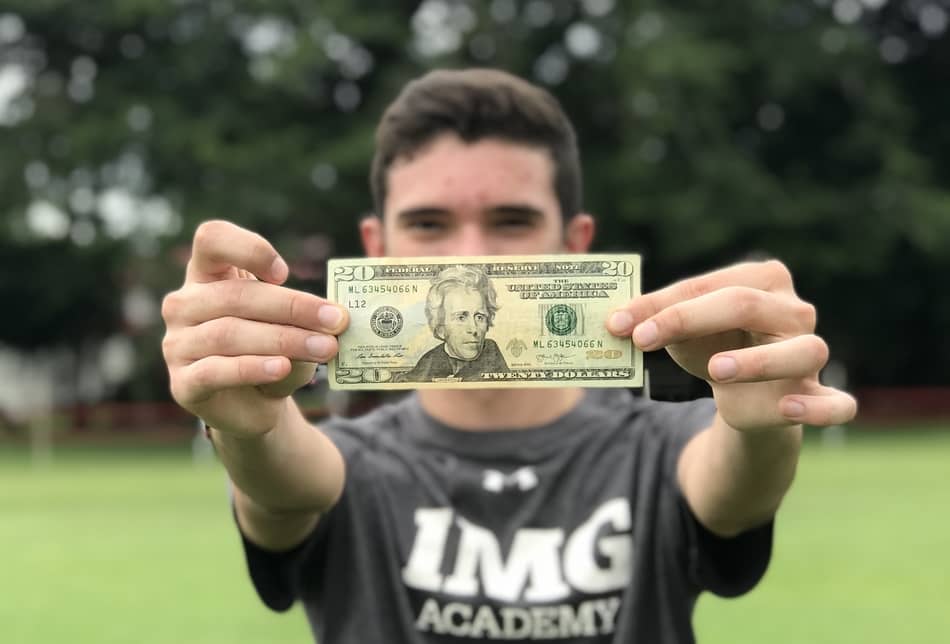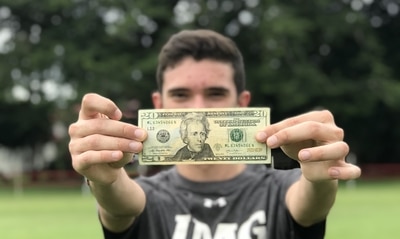
In sports, we’ve all seen a considerable increase in how much athletes are getting paid. Particularly in soccer, it seems scary, and sometimes qualified as unethical, the colossal amounts of money that are being transferred both for buying players and then to pay for those player’s salaries. When we see Forbe’s best-paid athletes of 2020, we notice that 3 out of the top 5 best paid are soccer players. Those being Lionel Messi, Cristiano Ronaldo, and Neymar.
So, why are soccer players paid so much? The reason they are paid these amounts of money can be explained with simple economic principles such as supply and demand, and inflation through time. However, I really believe that during the last years speculation has played an important role in making prices in soccer go up.
At first, you might feel confused about the concepts I mentioned above but feel free to keep reading to understand completely what I am talking about. After you finish reading this article, not only you will know why soccer players are paid so much, but you’ll also understand more about how economics and finance work so you can apply that knowledge to any other area of your daily life.
Soccer is the most popular sport in the world
I wrote an article with 17 Reasons Why Soccer Is The Most Popular Sport in the World. Understanding the reasons I talked about in that article will help you understand a lot better why soccer players are paid so much. You see, more audience is equal to more money. Think about this example: Which billboard do you think is more expensive for someone to advertise at: One in a little town of Montana or one in Times Square, New York? Obviously, in New York, your advertisement will reach more people which means you’ll have to pay more.
The same happens when you compare other sports with soccer. Think about volleyball, which had an audience of 9 million people during their last world championship. On the other hand, the last FIFA World Cup was seen by approximately 4 billion people. The difference is astronomical! Which player do you think will be paid better? Obviously soccer players.
Salaries in sports are not about how skilled you need to be in order to play the game. Not even in real life works like that. Sometimes, people that earn the most money are not necessarily the most skilled at something. Did you know that some of the most intelligent and skilled people in history such as Pablo Picasso and Isaac Newton were broke?
What I’m trying to say is that soccer might not be the hardest sport to learn how to play, actually, it is one of the easiest to understand which is one of the reasons why it is so popular. However, because it is so popular, more and more young people are playing it and wishing to become the next soccer superstar. Even though it is not hard to play there is A LOT of competition if you aspire to go pro one day.
In contrast to other sports popular in the United States like football, the competition to become a soccer player can be from any place and any continent of the world. This makes it even harder to become a professional in a system that makes sure that everyone who makes it to the pro level is actually very skilled in playing the game.
If you are interested in becoming a pro check out the article I wrote about How to Become a Professional Soccer Player.
Supply and Demand

Supply and demand is one of the most basic theories of economics that helps you understand all the markets around you. It also explains why soccer players are being paid so much. My intention is not to talk about boring concepts that no one understands, so I’ll try to be as simple as possible.
Have you ever asked yourself how the price of something is determined? Supply and demand is basically a relationship between the players skillful enough to become pros for the best teams in the world, and the clubs that hire those players. There might be a lot of players practicing the game,
but only a tiny percentage of those players have the necessary talent to become the next Messi, Mbappe, or Cristiano.
What makes something valuable? Something valuable is an item that everybody wants but not everyone can get because there are few of those. In technical words, when there is little supply but a huge demand the prices go up. On the other hand, when there is a lot of something, but nobody wants that something, the prices go down. So, big supply and small demand means prices are low. Remember that because it will be helpful for everything in your life from now on.
In soccer, there is a HUGE demand for skilled soccer players, which means that big clubs like Real Madrid, Liverpool, Bayern Munich are actively searching for players that might make a positive impact on their team. However, the supply of these players is scarce, meaning it is very hard to find a very skilled player.
According to the rule of supply and demand when there is a huge demand and little supply the prices go up. In this case, when clubs finally find a skilled player they’ll have to pay him well because his talent is scarce and hard to find.
However, this only explains why soccer player salaries are high, but remember that athletes don’t only earn money through their monthly payment but also through sponsorships.
Sponsorships

Players in soccer or any sport don’t only live based on a salary. In fact, most of their wealth comes from multiple sources outside of soccer like advertisements, partnerships, and sponsorships. Having a big audience is important and definitely explains why soccer players are paid so much, but the big money is in sponsorships and they not only value how much audience you have but also see who is your audience?
This explains why other sports like tennis or golf pay so much and don’t have the same audience (in numbers) like soccer. This is because the audience of these sports are perceived as a luxury audience, which means players can get partnerships with luxury brands that are the ones that pay the big bucks.
The greatest example of this is tennis player Roger Federer. 92% of Roger’s wealth comes from endorsements. I wanted to give this example because it demonstrates that sponsorships have an enormous impact on how much an athlete can earn. However, Roger is a unique example because, even though he is an excellent player, he has demonstrated magnificent skills managing his money outside of the pitch.
Even though no soccer player gets even close to Roger’s 92% of endorsement, they are still earning big money from that. The best example of this in my opinion is Cristiano Ronaldo. According to Forbes, approximately 42% of Cristiano’s Wealth comes from his endorsements. Inside the soccer field, he is one of the best players in the history of the game, but outside he is also an underwear supermodel, a huge businessman, hotel owner, and philanthropist.
Cristiano has more than 200 million followers on Instagram! He is the most followed person in the world. Just imagine how many millions he charges for sponsoring someone on his account. I think you’re starting to picture now why soccer players are paid so much.
Soccer is different from golf and tennis, which is why historically soccer athletes are not the #1 best paid. While golf and tennis sponsorships focus on the luxury target market, soccer sponsorships focus on reaching the biggest number of people possible. One advantage soccer has when analyzing endorsements in comparison to other sports is that the image soccer players project is more versatile and flexible. As a soccer player, you can promote a streetwear brand as well as a luxury brand like Rolex with few limitations because your audience spectrum is extremely diverse considering the number of people around the globe that watch soccer.
Inflation through time
Inflation is another economic term you’ll learn in this post. Put into simple words, inflation is the sudden increase in the prices of products. But, actually, when the prices of a product go up, it’s not because the product is more valuable. Instead, it is because money is devaluating from its past value.
In the case of soccer, players are not necessarily getting any better and becoming more expensive because of that. Soccer is simply being affected by inflation, as well as every other aspect of the economic environment we all live at. Players are worth the same as before, but money isn’t. Because money worths less now you need more of it to buy the same thing.
I remember when Real Madrid bought Cristiano Ronaldo back in 2009. He was the most expensive soccer player in history with a record fee of 94 million dollars. Everyone at that time was shocked because nobody ever had paid so much for a player. However, no one really questioned the transaction because Cristiano was probably the best player in the world at the moment. Years later Real Madrid would realize Cristiano was worth every penny and came out to be the best player in the club’s history.
However, years later, the record was broken again by Real Madrid when they bought Gareth Bale in 2013 for 110 million dollars. He wouldn’t be the last one to break Cristiano’s record. Other players like Mbappe, Griezman, Joao Felix, Dembele, Hazard, and many others were bought for more than Cristiano. Today, the most expensive player ever is Neymar whose transaction was an outstanding 240 million, although it is suspected they might have paid 400 million for him.
Today, Cristiano’s transaction from Manchester United to Real Madrid is the 11th most expensive one. In fact, he, the same player but 10 years older, was traded for more money later to Juventus. Does this mean all these other players are better than Ronaldo? Does it mean Cristiano is better than all the other players before that cost less than him? Not at all.
Inflation is why a pound of rice costs 0.30 cents back in 1970, but today, that same pound of rice might cost up to 5 dollars. Imagine how much a young Diego Maradona would cost in today’s market and how much he would get paid.
Money is less valuable every day. This is something I learned from reading Robert Kiyosaki’s book: Increase Your Financial IQ (click to see on Amazon). I know this a soccer page but if you are interested in personal finance books I highly recommend you read that book. Who would’ve thought a personal finance book would help me understand the soccer market and why players get paid so much, huh?
The price a club pays to acquire a player, which is proportional to the salary they will pay the same player, is not based on quality or talent only. Inflation plays a huge role, not only in the soccer transfer market but in all markets. However, I truly believe there is another factor that has played an important role in the increase in how much players get paid and cost: Speculation.
Speculation and Bad Negotiation
The next financial term we will learn today is speculation. Speculation is simply when someone buys an asset, in this case a player, with the hopes that it will increase its value in the future. The problem with speculation is that it’s not sure if the asset will actually increase its value, sue that there is a big risk that it can also decrease its value.
Now, translating that to “soccer language”, when a club speculates when buying and paying players they are paying a price for a player that has not proven to be worth what they are paying for.
Most of the transfers I mentioned above were mere speculation at the time they were done. For me, the greatest example is Ousmane Dembele. Barcelona paid more than 110 million dollars for him expecting he will be something near to the next Lionel Messi. Even though I agree Dembele was a great player at Dortmund, Barcelona was speculating when they bought him for an extremely exaggerated price and paid him a ridiculously high salary for a player that hadn’t won or proven anything at a big club.
After arriving at the club, Dembele never adapted and constantly was getting injured. Now Barcelona has a financial problem because they have to pay an incredibly high salary to a player that is not playing and they even had to buy a new player to cover him while he was injured, which ended up doubling the club’s expense.
Besides being the most popular sport in the world, having great sponsorships and considerable inflation through time, soccer players cost and are paid too much today also because of growing speculation and bad negotiation in the industry when clubs pay too much for players that haven’t prove anything.
What is Financial Fair Play?

Another reason why players are getting paid so much is because of the enormous amounts of money that are being injected into the game. There are a lot of multimillionaire investors, especially from the middle east, that bought big European clubs. The greatest examples of this are the Paris Saint Germain and Manchester City. It’s as these clubs suddenly had unlimited resources to buy and pay for the players that they pleased.
These clubs (owned by billionaire investors) were being criticized a lot because they said their owners were giving them an unfair financial advantage over the rest. A couple of years back, PSG and Manchester City were two average clubs. Today, thanks to all the money invested in those organizations, they’ve become two of the most important protagonists of European football.
To fight against this unfair disadvantage and prevent teams from getting in big amounts of debt in order to compete, UEFA implemented what they call Financial Fair Play (FFP). What this is all about is a rule that obligates clubs to spend less than what they’re earning. For example, if the club earns 800 million in a year by selling jerseys, tickets, and players to other clubs they can only spend 800 million to buy players for the next year.
What happens if teams breach the Financial Fair Play? They get sanctioned, most likely with a ban from playing the UEFA Champions League. In fact, this happened last year when UEFA sanctioned Manchester City for disobeying what was established in the FFP. Later on, the sanctioned was overturned.
Anyways, I believe this is a great strategy to prevent speculation and bad negotiation when clubs spend irrational amounts of money on players. At the end of the day, not only soccer, but I truly believe that in most sports we’re seeing amounts of money being paid to people that don’t make any sense.
Are soccer players paid too much?
This part is going to be more political opinion rather than a soccer one. I do think soccer players and most other elite sports athletes are being paid too much. I recognize the enormous effort and sacrifice it requires to get to be a professional soccer player and I know it is something extremely hard to achieve, but I don’t think the money that is being handled by players today is rational any more.
If we think about it, every single profession on this planet requires an amount of effort to be competitive at it. Some more than others obviously. A doctor has to study for 8-10 years to be a specialist. I truly believe that doctors worked harder to be where they are and they play a vital role in every society. Why aren’t they getting paid as much as athletes?
Our world is not equal and there are great differences between social classes. I do believe elite athletes have to be paid well but I think that the money we’re seeing transferred for a player and paying them is getting out of control. I don’t know if it is even healthy for themselves to be poor and suddenly have so much money overnight. If you don’t know what to do with it you can get traumatized and be broke the next day.
If we as a society dedicated the same effort and diversified the money in a more fair way among all the economic sectors I think we would live in a much better world. A world in which maybe we could enjoy soccer even more.
Related Questions
Why are women paid less than men in soccer? I believe it is because women soccer, and sports in general, is less commercial. Men have been playing soccer professionally for more than 140 years while there were stereotypes in past generations that rejected women from practicing sports. This has created a culture in which most sports, including soccer, are man based mostly.
This has caused that men’s soccer is considerably more watched than women’s. As we spoke before in this article, more audience means more money. Hopefully, in the future, women’s soccer becomes more popular, and female salary gets much closer to what men are earning. I think they are going in the right direction. Make sure to read my article about this topic by clicking here.

